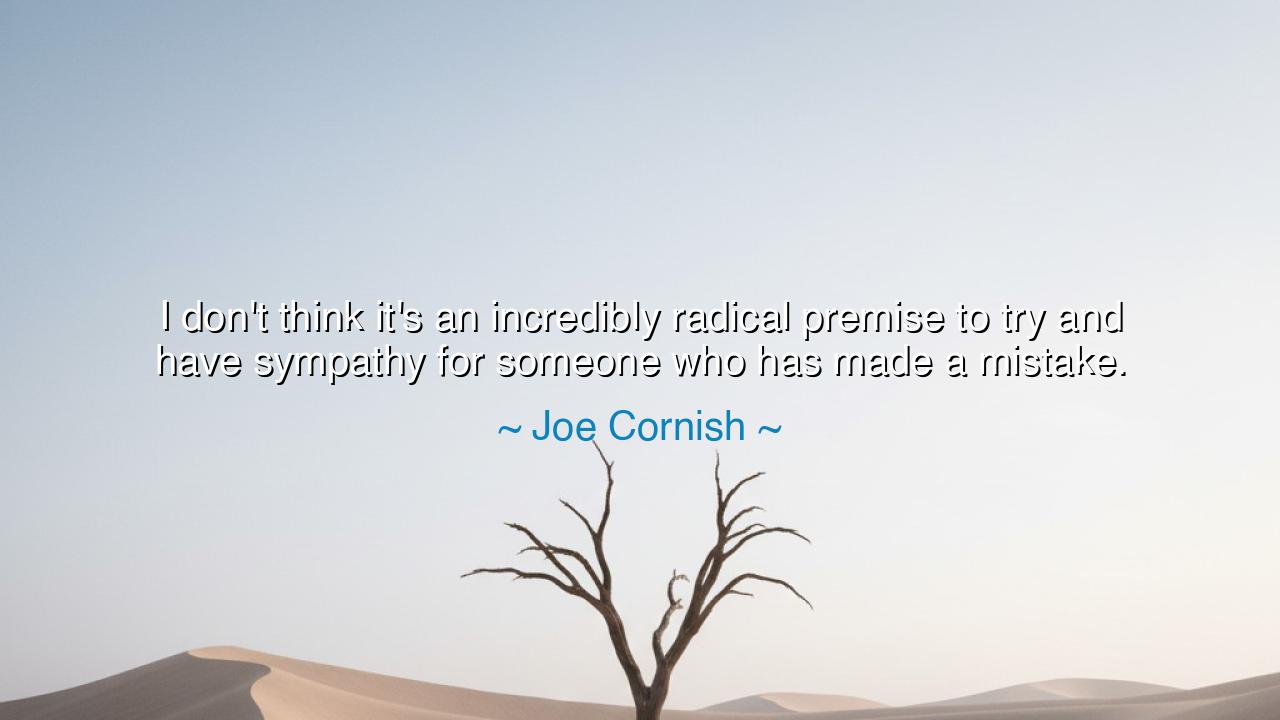
I don't think it's an incredibly radical premise to try and have
I don't think it's an incredibly radical premise to try and have sympathy for someone who has made a mistake.






When Joe Cornish declared, “I don't think it's an incredibly radical premise to try and have sympathy for someone who has made a mistake,” he was naming a truth that has been known since the dawn of humanity, yet one that is easily forgotten in times of judgment. His words remind us that mistakes are the common inheritance of all mortals, that no one walks through life without stumbling. To extend sympathy to the one who has erred is not weakness, nor radical idealism—it is simply the acknowledgment of our shared humanity.
At the heart of his statement lies the distinction between condemnation and compassion. Condemnation is the easy path: it requires no effort, no imagination, no humility. One points at the fallen and declares them guilty, as though guilt alone defines them. But compassion demands more. It asks us to see not only the error but the person behind it, to remember that a single act need not erase an entire soul. Cornish’s words suggest that such sympathy should not be extraordinary—it should be natural, instinctive, and expected.
History is filled with examples where societies failed this test and where they rose to it. Consider the story of Mary Magdalene, condemned by her peers for her sins. To the crowd, she was nothing but her mistakes, deserving only of shame. But Christ, in a moment of eternal teaching, declared, “Let he who is without sin cast the first stone.” In that instant, he revealed the hollowness of condemnation and the strength of mercy. The sympathy he extended was not radical—it was truth itself. And it changed not only her life, but the moral compass of those who listened.
Cornish’s reflection also speaks to the modern world, where public shame often spreads faster than understanding. In an age of unforgiving judgment, a mistake can be magnified into a permanent brand upon the soul. Yet his words remind us that what should be natural—offering sympathy—has come to seem rare. To extend kindness to the flawed is not to deny accountability, but to affirm that even those who falter deserve the chance to rise again.
The lesson, O seekers, is clear: when confronted with the mistakes of others, choose the higher path. Ask not first, “How can I condemn?” but rather, “How can I help restore?” Remember always that you, too, have erred, and that your own survival through shame was likely made lighter by the sympathy of another. To withhold compassion is to forget your own need for it; to extend it is to strengthen the invisible bonds that hold humanity together.
Practical action lies before you: when someone around you falters, resist the urge to dismiss them as broken. Instead, listen, understand, and offer the grace of sympathy. This does not mean excusing harm, but it does mean refusing to let mistakes erase humanity. In your work, in your friendships, in your communities, be the one who builds bridges rather than walls, who sees beyond error into possibility.
Therefore, let Cornish’s words endure as a commandment: sympathy for those who err is not radical—it is human. To forget this truth is to harden the heart and divide the world into false categories of the flawless and the fallen. But to remember it is to act with wisdom, humility, and love. And in such actions, we not only lift the fallen, but remind ourselves that mercy is the noblest companion of justice.






AAdministratorAdministrator
Welcome, honored guests. Please leave a comment, we will respond soon